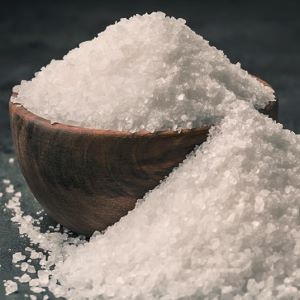By Jeanne Yacoubou, MS
In January 2025, a reader requested The Vegetarian Useful resource Group if magnesium chloride (MgCl2) “…is all the time vegan.” Primarily based on earlier data of this ingredient and up to date confirmations by a number of impartial producers, we affirm that magnesium chloride and a associated substance, nigari, are each all the time vegan.
What Is Magnesium Chloride?
Magnesium chloride is a naturally occurring mineral salt that’s generally extracted from seawater. It might even be harvested from underground mineral deposits in seabeds. Cheap with a low freezing level, MgCl2 is often used for winter street deicing. This chemical can be antibacterial, odor-inhibiting, and hygroscopic (water-loving). These properties make it very best to be used in family cleansing and private care merchandise in addition to in cosmetics. Magnesium chloride can be utilized in fertilizers and animal feed. It’s bought as a powder, flakes, or liquid.
A typical meals use for MgCl2 is as a coagulant in tofu manufacturing. It serves this operate by thickening soymilk into curds to allow them to be extra simply pressed right into a strong block. Gypsum (calcium sulfate) is the commonest coagulant for tofu manufacturing and ends in a smooth and silky texture.
Magnesium chloride is used because the coagulant when firmer tofu is desired. Some eaters report that MgCl2 confers a bitter style to tofu whereas gypsum lends candy notes to it. Magnesium chloride acts extra rapidly in soymilk coagulation than gypsum, so is most well-liked when manufacturing time is proscribed.
What Is Nigari?
Nigari is a substance mostly derived from seawater evaporation and used as a tofu coagulant. Nigari is bought as a liquid, coarse granules, or effective crystals.
Nigari is shaped after the extraction of sodium chloride (NaCl) and calcium sulfate from seawater. The remaining liquid, known as bittern, primarily accommodates magnesium chloride and different hint substances similar to potassium chloride and magnesium sulfate. Nigari is the Japanese phrase for bittern. The bitter notes in tofu made utilizing nigari are because of the presence of magnesium sulfate.
In keeping with Japanese nigari producers, genuine nigari accommodates 5 elements magnesium chloride to 1 half sodium chloride with small portions of different hint mineral salts. To acquire this, seawater is kettle-boiled, leaving sodium crystals on the underside whereas nigari is the remaining liquid on prime. Options consisting solely of seawater or constituted of magnesium chloride dissolved in water could also be bought as nigari however will not be genuine nigari.
Nigari produced by way of sun-drying seawater accommodates giant quantities of magnesium sulfate, making the ensuing product bitter. Reverse osmosis or ion alternate strategies are fashionable strategies to supply nigari. The previous yields each pure water and concentrated seawater with excessive quantities of sodium chloride. The latter is added again to the water, yielding very salty-tasting nigari water. Nigari made by ion alternate lacks each the bitter sulfate ions and poisonous contaminants similar to PCBs, dioxins, arsenic, mercury, and lead. It’s the most secure, most pleasant-tasting type of nigari obtainable.
Producer Confirmations on the Vegan Standing of Magnesium Chloride and Nigari
The VRG requested eight producers of magnesium chloride and nigari about these elements’ origin and processing. Listed below are the responses we acquired.
Q: Is your meals grade magnesium chloride derived from or processed with animal elements?
From Adnan Heikal of Alliance Chemical:
A: “This product doesn’t include any declared animal-origin supplies [or processing aids] in its composition.”
From Owen Donald of Celtic Chemical compounds:
A: “None of our merchandise are derived from animal elements [or have] animal-derived processing aids concerned of their manufacture.”
Q: Is your meals grade nigari derived from or processed with animal elements?
From Sandra Gibson of Sea Salts of Hawaii:
A: “No, it is just deep ocean magnesium photo voltaic evaporated, not different elements.”
From Newfoundland Salt Firm:
A: “No.”
From Ema Sogabe of Mitoku Co.:
A: “Our Nigari doesn’t include any animal/animal derived elements/processing aids. As matter of truth, we wish to verify that there are not any animal derived elements/processing aids on the processing website in any respect.”
The contents of this posting, our web site and our different publications, together with Vegan Journal, will not be supposed to offer private medical recommendation. Medical recommendation ought to be obtained from a certified well being skilled. We regularly rely on product and ingredient
info from firm statements. It’s unimaginable to be 100% positive a few assertion, information can change, individuals have totally different views, and errors will be made. Please use your finest judgment about whether or not a product is appropriate for you. To make certain, do additional analysis or affirmation by yourself.
Extra ingredient listings are at https://www.vrg.org/elements/index.php
Help VRG analysis at www.vrg.org/donate


